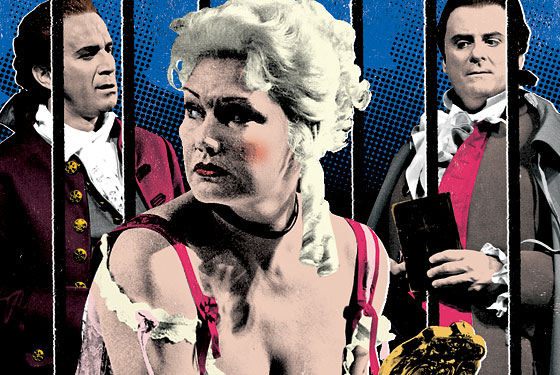
Is there anything more delightful to a diva than the opportunity to play a beautiful girl so besotted with herself, and with the wrong man, that she is inevitably brought to abandonment and a nasty death? Two seasons ago, the queenly Renée Fleming tried on the title role in Massenet’s Manon, wrapping the bejeweled vocal line around her as if she had been born to play a teenager with fatally bad judgment. Now Karita Mattila is taking a crack at the same character, this time in Puccini’s somewhat soggy version, Manon Lescaut. Neither of these operas has merited a fresh staging at the Met, so both stars had to make do with overblown décor—in Mattila’s case, a 28-year-old production by Giancarlo Menotti that struck one reviewer as old-fashioned even when it was new, and that hasn’t shown itself since 1990. The Met has purged Menotti’s name from the program, and asked Gina Lapinski to redirect the action through Desmond Heeley’s vintage sets, which still get applause for the frescoed ceilings of Manon’s rococo boudoir and the iron-and-stone glower of the port at Le Havre.
But nobody goes to Manon Lescaut for the décor. All depends on the soprano, who must be able to make the journey from kept woman to unkempt prisoner, and from girlishness to abjection, before her life peters out in an American desert. Mattila was an almost-Manon. With her diamond-honed voice and her intensity of tone, she has dominated the fiercest roles—swashbuckling through Fidelio, clamoring for blood in Salome, surviving in Jenufa. Victims suit her less. She came to Puccini’s weepie with the same intelligence and sensitivity that have made her one of the Met’s indispensable ladies, but the score never quite settled on her skin. Her Act Two romp was like watching a statue try to flirt, and she impaled herself on the contradiction of the final act, in which she expires unhurriedly and with a muscular soliloquy. “Sola, perduta, abbandonata,” Manon laments—alone, lost, abandoned—but Mattila didn’t seem to believe it. Whatever desperation she had to suffer next, she could always look forward to the lavish comforts of the curtain call.
Among the problems that the Soviet Union left behind is an ethical one: what to do about its art. Most modern tyrannies quash creativity so thoroughly that their artistic legacies can be comfortably ignored. Soviet Russia offers no such solace: It bequeathed the world an inheritance of very fine music made under morally dubious circumstances. It’s impossible to perform a Shostakovich symphony without confronting the fact that each note might have given the government an opportunity to jail him. The score is the result of what he was allowed—and what he allowed himself—to put down on paper. Talent meant, among other things, the ability to channel terror, feign enthusiasm, and risk some sly defiance.
Leon Botstein, the conductor and scholarly mastermind of the American Symphony Orchestra, is not one to be put off by historical and ethical complexities. Indeed, he likes nothing better than to wade into them, armed with erudite essays. Some years ago, Botstein even conducted Prokofiev’s Zdravitsa, a craven but beautifully crafted choral homage to Stalin, and turned it into what pedagogues call a teachable moment. For the orchestra’s most recent foray into the totalitarian treasury, Botstein turned up some oddments from the twenties and a semiprecious stone or two, all of which the orchestra played with gusto. It was intriguing, if not quite electrifying, to hear Gavriil Popov’s Komsomol, Patron of Electrification, which included a theremin, that early electronic instrument with its attractively spooky wail. The orchestra also gave the U.S. premiere of Arthur Lourié’s lovely and peculiarly Russian choral eulogy for the poet Alexander Blok, Chant funèbre sur la mort d’un poète, its hollow harmonies and beautiful dissonances tolling like a cracked bell.
The comparatively permissive period between the 1917 revolution and Stalin’s first crackdown in 1934 also produced Alexander Mosolov’s gloriously cacophonic Zavod, or The Iron Foundry, the only surviving episode of a grand ballet called Steel. Botstein waved, fiddlers scraped, trombones wheezed, and a thunder sheet thundered, in imitation of a factory’s brutal repetitions. If all this sounded surprisingly familiar, it’s not only because several of Mosolov’s non-Soviet contemporaries (Arthur Honegger, George Antheil) also emulated factory noises; his behemoth’s march has recently been revived in the wild, limping-Godzilla tread in Thomas Adès’ ten-year-old orchestral work Asyla, or in the sledgehammer rhythms used by the New York composer Michael Gordon. That just goes to show how perilous it is to try to glean socio-political content from listening to music: The language of a loyal hosanna to a Bolshevik factory adapts quite nicely to the post-industrial West.
That, however, is exactly how every measure was heard in Soviet Russia. During the twenties, two groups tried to regulate new music in the U.S.S.R. The Association of Contemporary Music promoted a vigorous modernism, while the Russian Association of Proletarian Musicians demanded a populist style based on folk songs; composers were left trying to second-guess the ideologues. One of the system’s nimbler manipulators was the composer Vladimir Shcherbachov, whose Second Symphony, a vocal epic based on texts by Blok, displays the hotly romantic style that the composer had developed before the revolution and managed to hold on to well into the new era. Seventy years on, Botstein, who loves nothing better than to resurrect interred masterpieces, conducted its U.S. premiere like a true believer, and the orchestra played its heart out. But by the end of the evening, the symphony had become more resoundingly minor than ever. Each movement opens with a sharp, shimmering idea—a jittery rhythm, a restless tune—then quickly loses its way. The final movement, an interminable setting of a Dante-meets-Dracula nightmare, plods haplessly into the night, like an earnest composer groping blindly toward Stalin’s capricious maw.
Manon Lescaut
By Giacomo Puccini.
The Metropolitan Opera. Through February 23.
